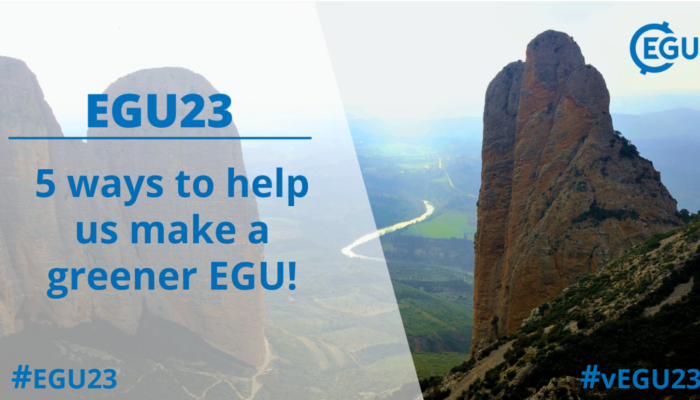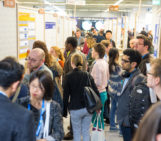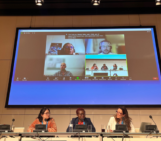
For several years, EGU has committed – both in terms of resources and research – to help create a cleaner and greener environment. As our biggest event of the year (EGU23) soon approaches, nearly 14,000 people are expected to travel to Vienna for the week-long conference. An event of this scale can impact the environment any number of ways. The good news? Even the smallest of actions can help mitigate this impact and make a difference to our environmental footprint… and you can support us in this mission!
We list five ways that require just a little planning ahead to support EGU’s green initiatives. Read on to discover how you can help.
#1: Prioritize eco-friendly travel
If you are joining us in Vienna, we recommend making conscious choices when it comes to your travel – whether this is to/from Vienna or travel within the city. The Austria Center Vienna (ACV) is well accessible by all modes of transport, which can be compared using the website www.greenmobility.de. Instead of private vehicles, choose the city train, bus, or metro whenever possible – made even easier by the free public transportation ticket included with on-site EGU23 registration (printed on the backside of your name badge)! You can also bike to the conference center (bicycles can be rented through CityBike Vienna, Donkey Bike, or Copa Cagrana Rad und Skaterverleih) and if you’re feeling adventurous, how about a walk?
#2: Embrace the digital life, it’s 2023!
EGU23 will combine all the best elements of our previous virtual General Assemblies with the pre-pandemic on-site experience – this means exciting new ways to communicate digitally. Some simple ways to do this include creating an online personal programme using the EGU23 website or mobile app for iOS or Android (avoid printing programmes) and sharing your messages/material through scannable QR-codes (avoid the distribution of flyers or other printed materials). The fully-hybrid format also allows you to participate in the conference virtually, helping you take time for science no matter where you tune in from!
#3: Pack reusable products
Did you know that since 2018, EGU’s move to encourage reusable water bottles has saved about 30,000 single-use PET water bottles per year? (Based on the number distributed in 2017). As organisers, we do our best to minimize waste as much as possible, but our attendees can make a big difference here! With a little planning, you can ensure a well packed bag with essentials like a reusable water bottle, coffee cup/mug, straw, and cloth napkin. Biodegradable waste bags are also a good idea, as well as reusable food containers in place of throw-away containers. For more ideas, check out this blog or read this article for inspiration.
#4: Adhere to the Center’s waste practices
The Austria Center Vienna, our host in the city, particularly welcomes and certifies green meetings in compliance with the Austrian Ecolabel. Over the years, the Center has introduced several initiatives to reduce its environmental impact. Some of these include the use of energy-saving LEDs, a solar array to heat the water used in the kitchens and toilets, and working with an in-house catering company compliant with green standards. During EGU23, we advise all participants to follow the Center’s practices on waste segregation and the reusing of personal cutlery during the conference. There will be physical signs displayed to help guide you, but if ever in doubt, just ask a member of the support staff or the event organisers.
#5: Join the discussion!
If you would like to learn more about sustainability and the latest research to mitigate climate change, we encourage you to participate in the TM21 townhall session ““Power To & By the People”: Collective action models for energy transition and social innovation” taking place on 27 April 19:00–20:00 (CET). This Townhall will include a short film screening, providing the basis for a wider conversation on the potential of citizen-led energy transition initiatives. You can also look out for the ITS3 session – “Sustainable energy, geo-resources, and land-use for the future” This includes topics like ITS3.5/CL3.6 “Nature-based Solutions for climate change adaptation” and ITS3.1/ERE4.7 “Challenges of circularity: Considering the energy and material demands/benefits of a circular economy across global supply chains.”
We hope this blog has inspired you to make a difference to the environment in ways big and small! In closing, we’ll leave you with a few initiatives that EGU has been putting in place toward a greener General Assembly:
- We no longer print a paper programme book and instead encourage attendees to access the programme online and/or through smartphones. This has saved about 1 million printed A5 pages per year since 2018!
- The daily newsletter EGU Today went fully digital in 2019, remaining a popular source of information while saving 15,000 double-sided A4 printed pages per year. Make sure to check it regularly from Sunday 23 April to Friday 28 April here!
- EGU note pads and flyers are printed on FSC-certified recycled paper, offsetting the environmental impact of producing the flyers on regular paper.
- Since 2020, EGU pens distributed at the EGU booth are made of bamboo rather than plastic.
- Name badges consist of lanyards made of 100% recycled PET and a paper badge made of 100% FSC-recycled paper. Since 2020, the paper badges are no longer pocketed in a plastic sleeve. Attendees are also encouraged to bring their EGU lanyard from a past conference or, if taking a lanyard this year on-site, reuse it next year.
- The meeting’s 1,500 sqm of signage is made from polyurethane hard foam (PU). We reuse these signs for 3 to 5 years and limit the production of new ones. These signs are stored directly in the ACV to avoid transport.
Do you have additional ideas for a GreenEGU? Let us know in the comments below!




